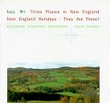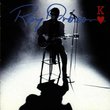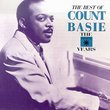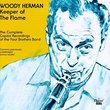| All Artists: Elliott Carter, Michael Gielen, SWR Baden-Baden and Freiburg Symphony Orchestra, SWF Sinfonieorchester Baden-Baden, Ursula Oppens Title: Elliott Carter: Piano Concerto; Concerto for Orchestra; Concerto for Orchestra; Three Occasions Members Wishing: 0 Total Copies: 0 Label: Arte Nova Classics Original Release Date: 1/1/2005 Re-Release Date: 6/14/2005 Genre: Classical Styles: Forms & Genres, Concertos, Historical Periods, Modern, 20th, & 21st Century, Instruments, Keyboard, Symphonies Number of Discs: 1 SwapaCD Credits: 1 UPC: 723721120955 |
Search - Elliott Carter, Michael Gielen, SWR Baden-Baden and Freiburg Symphony Orchestra :: Elliott Carter: Piano Concerto; Concerto for Orchestra; Concerto for Orchestra; Three Occasions
CD DetailsSimilarly Requested CDs
|
CD ReviewsStrong 1992 performances R. Hutchinson | a world ruled by fossil fuels and fossil minds | 08/04/2005 (5 out of 5 stars) "This is a reissue of the 1992 Arte Nova disc which featured a spectacularly inappropriate still-life flower vase for a cover. These orchestral works by Elliott Carter are complex and teeming with conflict and dynamism, just like ... a vase of flowers. The unidentified cityscape is a big improvement, a standard symbol for modernity, complexity and motion. This is the second recording of the "Piano Concerto" (1964-5 -- 22'31) by the team of conductor Michael Gielen and Ursula Oppens on piano, following their 1984 recording with the Cincinnati Symphony Orchestra on New World. This recording from eight years later with the SWF Symphony Orchestra of Baden-Baden is better, much better. The "Piano Concerto" is not one of Carter's best works, but this is its best performance and recording. It was written in Berlin near an American target range not long after the Wall went up, and the sound of machine guns is echoed in the eruptions of the orchestra in the second movement. Metaphysically, the "Piano Concerto" seems to have been inspired by the global "Cold War" conflict to address the tragedy of intractable human conflict. The highlight of the disc is a performance of one of Carter's masterpieces, the "Concerto for Orchestra" (1969 -- 22'23). Commissioned by Leonard Bernstein and the New York Philharmonic, their original recording failed to do justice to this fantastically complex work. The "Concerto" features four groups of instruments, each proceeding at a different tempo through the work, one of the best examples of this dynamic structural innovation in Carter's oeuvre. Gielen's recording follows by only a year the recording by Oliver Knussen and the London Sinfonietta, a performance supervised by the composer. I believe that 1991 Virgin recording, now reissued on EMI,stands as the finest available (see my review), but this is a strong alternative. Gielen leads the SWFSO to more powerful tutti passages than Knussen, but Knussen's reading is more transparent, more like Boulez in laying bare the intricacies of the score. Another advantage of the Virgin recording is that the "Concerto" is separated into six tracks, which makes it easier to hear the logic of the movements by listening to them one at a time. The "Three Occasions for Orchestra" (1968-9 -- 17') is also found on the 1991 Virgin/EMI disc. This live recording does not compare to the crisper studio recording, but this Arte Nova disc affords an opportunity to hear an excellent Carter work at a bargain price." Worth having for the piano concerto-one of EC's best pieces Peter Heddon | 09/25/2005 (3 out of 5 stars) "The Piano concerto is one of Carter's finest achievements.
Initially, seeming like the hermetic norm one assosciates with this composer it slowly emerges as a piece with a real sense of passion and fantasy.On this rare occasion unleashed from his Nadia Boulanger heritage,there's something very likeable about the way the piano weaves it's way through an unwieldy orchestral mass.The melodic writing(most notably a bass clarinet solo)is also surprisingly engaging.A bleak piece-composed in Berlin amidst the height Cold War tensions-but strangely compelling. Concerto for Orchestra remains a tough nut to crack.Maybe i need to hear the Knussen recording but it's hard to fathom the continuity and allure of this piece.It seems to have been composed by the page,without the fierce sense of urgency which are the hallmarks of equally dense orchestral works of Xenakis and Stockhausen. Still,there are interesting features.Most notably,the way in which the orchestral piano almost takes on a heroic,soloistic role. The three occasions might veer slightly in the direction of dryness but atleast no.1 has a splendidly visceral climax 1.5 minutes in! Rather dreary trombone line in no.2,but things improve in no.3 where Lulu-like string lines are accompanied by spasmodic yet urgent ticking motifs." |

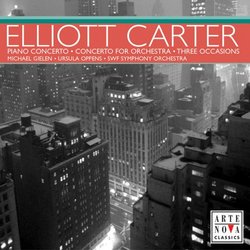
 Track Listings (6) - Disc #1
Track Listings (6) - Disc #1